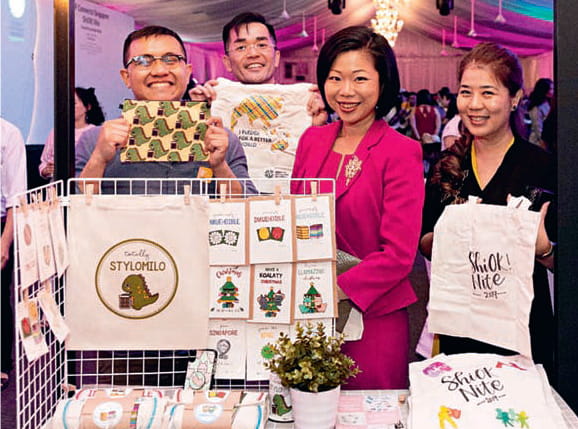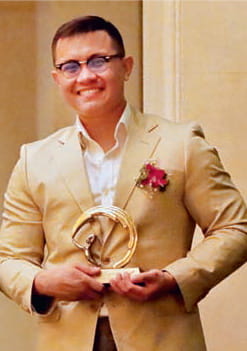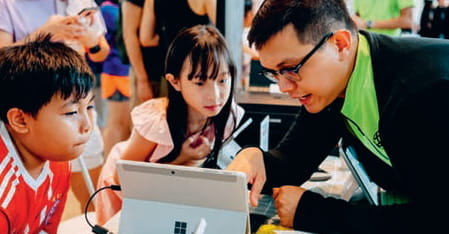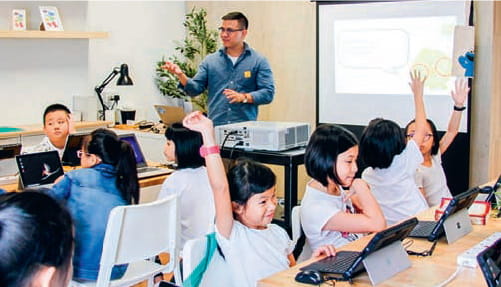Stories > The Power of Creativity
The Power of Creativity
SIF Citizen Ambassador Aminur Rasyid Mohamed Anwar equips disadvantaged and disabled people with digital literacy skills and self-confidence through his creative Powerpoint workshops.
BY CARA YAP
PHOTOS SIF; THE STRAITS TIMES/SPH
minur Rasyid Mohamed Anwar is no stranger to missed opportunities. As a creatively inclined student who struggled academically, he lacked the confidence to explore his passion in art. Classes, as the self-professed introvert recalls, were spent quietly doodling in his exercise book.

Social entrepreneur Aminur; SIF governor David Chong; Singapore Senior Minister of State Ms Sim Ann; and SIF executive director Jean Tan at the SIF’s 2019 edition of ShiOK! Nite.
“I did not feel motivated at school as I felt a sense of inferiority, compared to classmates who fared well. Though I enjoyed art lessons, I did not think this was something I could pursue professionally,” he shares. He eventually studied electrical engineering at the Institute of Technical Education as it seemed like a practical course for securing employment. This led to his work as a ground staff with Delta Airlines, a job that allowed him to travel frequently. It was during those trips that he visited museums, which revived his love of art.
After bandying about the idea of using art to help disadvantaged kids with his elder sister, Nur Llyana, an art teacher, they founded Junior Art Lab in 2016. Then an enrichment centre of sorts, it sought to teach young people digital proficiency by creating illustrations using Microsoft Powerpoint. This was chosen over more conventional design software such as Adobe Photoshop for its accessibility and ease of navigation. Aminur had experimented with the Powerpoint programme for eight years as he previously could not afford the Adobe suite.

For his work with young people, Aminur received the 2019 Silent Heroes Award, conferred by the Civilians Association of Singapore.
EMPOWERING THROUGH ART
For Aminur, taking the plunge to start his own venture was not daunting, as it was something he had deliberated for years. The encouragement he received from Llyana – whom he describes as a role model – gave him that final push. His sally into entrepreneurship without prior experience, however, proved more challenging.
Relying on promotion through flyers and word of mouth, they were only able to reach out to a handful of kids. Thankfully, the duo received mentorship from non-profit youth organisation Scape’s SOIMPACT bootcamp for budding young entrepreneurs in 2017, where they learnt about different business models. It was during this period that the siblings decided to offer their services to local organisations instead of just individuals. This way, they could stay sustainable and more effectively reach the demographic of disadvantaged children they sought to help.
For a start, the social enterprise began working with Club Rainbow, a non-profit organisation that supports children with chronic conditions and life-threatening illnesses. Here, they met Sayfullah, a student who suffers from cerebral palsy. “Sayfullah’s mother shared her anxieties over his ability to become financially independent,” recalls Aminur, who learnt more about the quotidian struggles of the disabled through their interactions.
The experience spurred him to empower more disabled students. He began helping to print designs created by disabled students on merchandise, including tote bags and coasters, and selling them at flea markets, as well as on Junior Art Lab’s website. Artists receive royalties for items sold. According to him, the venture has met with success, with between 100 and 200 products sold at each flea market. As it turns out, Aminur and Llyana, who showed him the ropes to teaching before Aminur took over the venture, won the third prize at SOIMPACT.
“I Was Amazed By How Driven People From Developing Countries Such As India And Indonesia Are In Following Through With Their Causes Despite Their Lack Of Funding.”
Aminur Rasyid, Founder, Junior Art Lab
BROADENED PERSPECTIVES
Apart from providing funding, Scape also informed them about the Singapore International Foundation’s (SIF) Young Social Entrepreneurs (YSE) 2018 programme. Here, he learnt how to structure his business model to make it more sustainable. This helped him guide the operational model of applying for community-based government funding to run programmes for non-profit organisations, at no cost to them.
The intensive programme also opened his eyes to the challenges faced by his international counterparts from around the world. “I was amazed by how driven people from developing countries such as India and Indonesia are in following through with their causes, despite their lack of funding,” he says. Conversely, his Indonesian counterparts expressed their surprise at the dichotomy between Singapore’s image as an affluent country driven solely by success and the altruism of its people.

Aminur co-founded edu-tech social enterprise Junior Art Lab with his sister. Here, he is seen at the SIF’s Bazaar for Good event, explaining to members of the public the digital tools that can be used to create works of art.
Aminur also forged a close friendship with Divanshu Kumar, founder of Involve Learning Solutions Foundation in India, which develops experience-based leadership skills in school students through peer teaching. “We connected over how to run educational programmes, and I admire his tenacity to keep doing his work despite not having grants or other funding,” he says.
Inspired by such global changemakers, Aminur also held workshops at a school in Bintan, where his father works as a fire chief. Since then, Junior Art Lab has offered its workshops to schools and corporations, and has worked with more than 30 organisations, including Microsoft, Youth Corps Singapore, People’s Association and Northlight School, an institute for students who are unable to attend the mainstream curriculum.
He says that the programmes’ success can be attributed to their experiential nature. “While vendors tend to focus on theoretical learning, our approach is more hands-on, with easy-to-understand concepts and challenges like designing useful robots or sustainable products,” he explains.
“Not Having A Mentor At School Whom I Could Share My Struggles With Meant That I Had To Decide My Career On My Own. I Want To Offer Students The Guidance I Did Not Receive, As Well As Teach Them Digital Skills.”
REIMAGINING DISABILITY As a winner of the SIF’s YSE 2018 programme, Aminur used the funding awarded to purchase laptops with touchscreen capabilities to cater to his disabled students, which include adults. To tailor lessons for students with varying disabilities, he employs different tactics, including adjusting the speed of the cursor as well as enlarging the screen.

Aminur deploys simple yet practical concepts to teach children as well as adults from disadvantaged backgrounds how to use Powerpoint, to create artworks that can then be printed on products such as tote bags and mugs, and sold to consumers.
Perhaps one of Junior Art Lab’s greatest success stories is Sayfullah, who two years on can create his own works. Along with Aminur, he was invited to a human library activity as part of the YSE’s 10th anniversary celebrations, where he inspired others with his personal experience. In line with the social enterprise’s sharpened focus on working with the disabled, it recently moved its headquarters to Enabling Village, a community space for both people with disabilities as well as the able-bodied.
For his efforts in inspiring young people, in 2019, the SIF nominated him for the Silent Heroes Awards, conferred by the Civilians Association of Singapore. He was among five Singaporeans who won the recognition. He reflects on how his own experience has led to him paying it forward.
“Not having a mentor at school whom I could share my struggles with meant that I had to decide my career on my own. I want to offer students the guidance I did not receive, as well as teach them digital skills that are increasingly relevant in today’s context,” he concludes.
|
CITIZEN AMBASSADOR The Singapore International Foundation (SIF) brings together Singaporeans and world communities to do good through our various programmes. To achieve this goal, many Singaporeans and Friends of Singapore enable our work by giving generously of their time, talent and treasure. Their collective efforts bring us closer to being a nation of responsible global citizens. In particular, Singaporeans play the role of Citizen Ambassadors when they volunteer to work alongside their overseas counterparts to shape new realities, while fostering greater intercultural understanding.
All our volunteers abide by the SIF Global Citizens Charter, which sets out the principles, values and behaviours expected of them, based on our mission. 
Scan here to find
|
